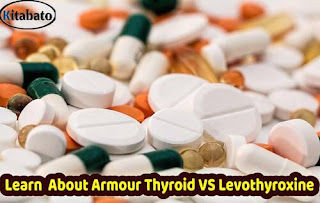If you have hypothyroidism, you've undoubtedly been given thyroid hormone replacement therapy. And, depending on the reason for your hypothyroidism, you may require lifetime therapy, so knowing your pharmaceutical choices is critical.
Thyroid hormone replacement drugs are classified as either natural (derived from animals) or synthetic (which are man-made). Read on to understand how they're created and recommended.
Armour Thyroid is a hypothyroid desiccated thyroid extract. This long-used thyroid drug may produce dangerous adverse effects including loss of appetite, anxiety, tremors, or seizures. Learn about Armour Thyroid side effects, alternatives, and precautions.
Armour Hypothyroidism is a condition that is treated by thyroid hormone. Depression, constipation, weight gain, dry skin, and other symptoms of hypothyroidism might occur.
Taking thyroid medicine, such as Armour Thyroid, may result in a variety of adverse effects, which include:
- tachypnea
- irregular menstrual cycles are a condition in which a woman's menstrual cycle is disrupted.
- anxiety
Learn About Armour Thyroid and how it functions!
A natural desiccated thyroid extract with the brand name Armour Thyroid is used to treat hypothyroidism in those who suffer from the condition. When the thyroid gland is underactive, it is referred to as hypothyroidism.
A natural desiccated thyroid extract is a medicine that is manufactured from dried animal thyroid glands and is used to treat thyroid problems.
Armour Thyroid, which is often manufactured from the thyroid glands of pigs, works by supplementing the hormones that your thyroid gland is unable to generate on its own.
Armour Thyroid medicine has a number of side effects.
Hormone levels may have an impact on a variety of different biological activities, resulting in possible imbalances. If you are using Armour Thyroid and you have any of the following symptoms, see your doctor immediately:
- a lack of desire to eat
- increased desire to eat tremors
- bursts of heat
- Having difficulty falling asleep
- breathing in small breaths
- fast reduction in body weight
- you get cramping in your legs
- Symptoms include headache, nausea, vomiting, anxiety, and fast mood swings.
- muscular sluggishness
- alterations in the menstrual cycle
There is a low incidence of these adverse effects. Typically, they indicate that your dosage is too high and that it should be reduced.
If you are using Armour Thyroid and you suffer any of the following symptoms, get medical treatment immediately.
Chest discomfort or tightness, Severe rash, quick heartbeat, extreme anxiety, seizure, or swelling of the limbs.
Interactions between medications
Armour Thyroid medicine may have an adverse reaction when used with other drugs.
If your doctor is contemplating beginning you on Armour Thyroid to treat your hypothyroidism, make sure they are aware of any prescription or nonprescription medications or supplements that you are already taking on a daily basis, such as the following:
- sucralfate or antacids are examples of such medications.
- iron
- Oral diabetic medicine with tricyclic antidepressants (metformin)
- Hormones, estrogen, or contraception are all options.
- Blood thinners such as omeprazole (warfarin)
- Digoxin, cholestyramine, and insulin are all examples of oral steroids (prednisone, dexamethasone)
Precautions that should be taken
There are a number of extra precautions you should take before starting to use Armour Thyroid, including the following:
Inform your doctor if you are pregnant, want to become pregnant, or are currently nursing a child. It is possible that you may need a dosage adjustment when pregnant or nursing.
The elderly, diabetics and those suffering from cardiovascular disease may be more vulnerable to heart attack and other negative consequences of smoking.
Unless otherwise instructed by your doctor, you will not be required to make any dietary adjustments while taking Armour Thyroid.
How should Armour Thyroid be given?
It is common for Armour Thyroid to be given orally once a day. The dose requirements are generally determined on an individual basis depending on the patient's requirements. Because your body must grow acclimated to the medication, the dosage is generally modest at the beginning of therapy.
If you have accidentally forgotten to take a tablet, do not take two pills at the same time. Simply continue taking your medicine as you usually would.
Armour Thyroid substitutes are available.
Natural desiccated thyroid was the first therapy for hypothyroidism. It is being used today. Over a century has elapsed since it was first used.
The development of a synthetic form of thyroxine (T4), one of the two principal hormones produced by the thyroid gland, began in the mid-1900s. Levothyroxine, often known as l-thyroxine, is a synthetic version of the hormone thyroxine.
Levothyroxine has replaced natural desiccated thyroid as the primary therapy for hypothyroidism, despite the fact that natural desiccated thyroid includes two important thyroid hormones — thyroxine (T4) and triiodothyronine (T3) — as well as other ingredients present in an organic thyroid. The following are brand names for levothyroxine: Levoxyl, Synthroid, Tirosint, and Unithroid
Natural desiccated thyroid medication brand names, in addition to Armour Thyroid, include the following: Nature-Throid, WP Thyroid, and NP Thyroid
The bottom line
Although Armour Thyroid is effective in alleviating the symptoms of hypothyroidism, the side effects that it may produce may be just as unpleasant as the symptoms themselves.
If you have any concerns regarding the adverse effects of Armour Thyroid, you should address them with your doctor before using them. Inquire as much about your doctor's preference for natural desiccated thyroid medications over levothyroxine in terms of effectiveness.
It's important to contact your doctor if you're experiencing any of the negative effects mentioned in this article while taking Armour Thyroid. If you have a serious adverse effect, such as difficulty breathing or a seizure, seek emergency medical attention immediately.


0 comments:
Post a Comment